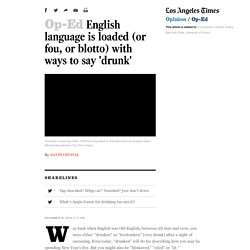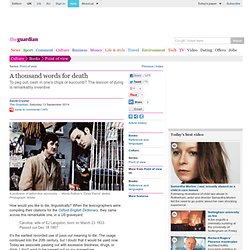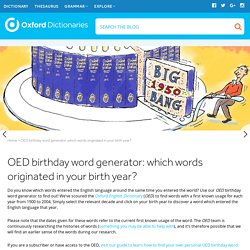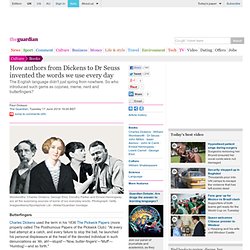

Language acquisition. Language. A language family tree - in pictures. English language is loaded (or fou, or blotto) with ways to say 'drunk' Way back when English was Old English, between AD 600 and 1100, you were either "drunken" or "fordrunken" (very drunk) after a night of carousing.

Even today, "drunken" will do for describing how you may be spending New Year's Eve. But you might also be "blinkered," "oiled" or "lit. " "Nothing in Old English vocabulary," writes David Crystal, in his new book, "Words in Time and Place," "anticipates the extraordinary growth of the alcoholic lexicon. " Crystal, with reference to the Oxford English Dictionary, charts that growth, documenting when and how 150 terms for too much of a good thing entered the language. In time for your New Year's revelry, here are a few of them: drunk, c. 1340.
Inebriate, 1497 (obsolete). Bousy, 1529. Fou, 1535. Tippled, 1564. Whip-cat, 1582 (obsolete). Pottical, 1586 (obsolete). Fox-drunk, 1592 (obsolete). In drink, 1598. Tap-shackled, 1604 (obsolete). In one's cups, 1611. Stewed, 1737. A thousand words for death. A profusion of defunctive synonymy … Monty Python’s ‘Dead Parrot’ sketch.

Photograph: Allstar How would you like to die, linguistically? When the lexicographers were compiling their citations for the Oxford English Dictionary, they came across this remarkable one, in a US graveyard: Caroline, wife of EJ Langston, born on March 23 1833. Passed out Dec 18 1867 It's the earliest recorded use of pass out meaning to die. Nor do I want any of the glorious deathy lexicon that accompanied the customer who brought Monty Python's legendary dead parrot back to the shop: Customer: "'E's bleedin' demised! " This profusion of defunctive synonymy is not a modern phenomenon. A remarkable creativity surrounds the vocabulary of death.
These European Word Origin Maps Are Fascinating. Do accents matter in modern Britain? Once, so long ago that it could have been in another life, I was required to take a voice test by the BBC.

I had been previously recorded reading the Autocue and, confounded perhaps by barely submerged cadences from the East End, someone found cause to worry. So off I went to the chief voice trainer – a man whose honey-coated, phonetically immaculate delivery made him a legend inside the corporation and beyond. He listened as I read a script that he had rattled off that morning on the Today programme. I just about passed muster. "Your voice is not my voice," he said kindly. The unstoppable march of hybrid bakery products. 9 October 2013Last updated at 14:41 GMT Magazine Monitor A collection of cultural artefacts.

Linguists reveal the 100 words that have shaped the English language. OED birthday word generator: which words originated in your birth year. Do you know which words entered the English language around the same time you entered the world?

Use our OED birthday word generator to find out! We’ve scoured the Oxford English Dictionary (OED) to find words with a first known usage for each year from 1900 to 2004. Simply select the relevant decade and click on your birth year to discover a word which entered the English language that year. Please note that the dates given for these words refer to the current first known usage of the word. The OED team is continuously researching the histories of words (something you may be able to help with), and it’s therefore possible that we will find an earlier sense of the words during our research. If you are a subscriber or have access to the OED, visit our guide to learn how to find your own personal OED birthday word.
Click on your birth year in the left-hand column to discover your OED birthday word. Words originating in the 1900s include: Why Americans Call Soccer 'Soccer' How different country refer to the game of soccer.

The shades of pink are variations and literal translations of "football," blues are "soccer," and greens are other etymologies. ( reddripper/reddit ) New Zealand's largest newspaper is deeply conflicted. With the World Cup underway in Brazil, should The New Zealand Herald refer to the "global round-ball game" as "soccer" or "football"? The question has been put to readers, and the readers have spoken. How authors from Dickens to Dr Seuss invented the words we use every day. Butterfingers Charles Dickens used the term in his 1836 The Pickwick Papers (more properly called The Posthumous Papers of the Pickwick Club): "At every bad attempt at a catch, and every failure to stop the ball, he launched his personal displeasure at the head of the devoted individual in such denunciations as 'Ah, ah!

—stupid'—'Now, butter-fingers'—'Muff'— 'Humbug'—and so forth. " Chintzy Originally this word meant to be decorated or covered with chintz, a calico print from India, or suggestive of a pattern in chintz. Spread Laughter and Cure Boredom. Are these the most endangered accents of English? The way we speak will always be a focus for anxiety.

It's because it encodes so much of what is important to us: where we come from, what social class we belong to, who we want to be like. It's not surprising then, that people worry about losing these indicators of identity. As culture becomes increasingly globalised, will the accents that marked communities out as different disappear? At this point some definitions might be helpful.